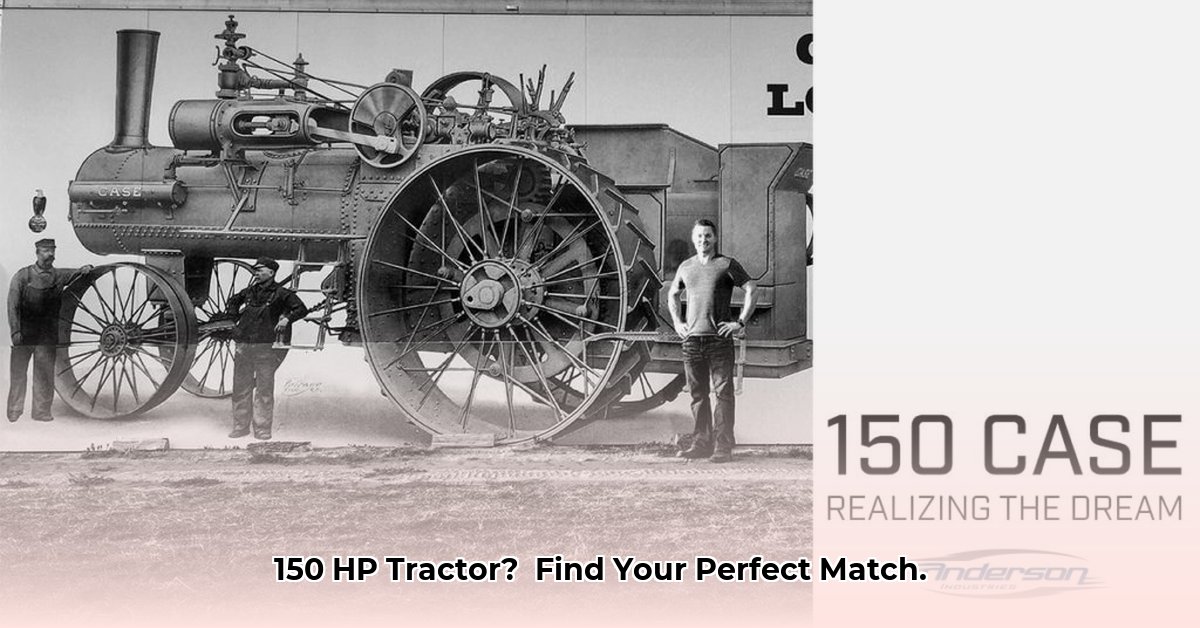
150 Case Tractor: Your Guide to Finding the Perfect Fit
The search for the ideal tractor can be daunting. But what if that perfect machine boasted a century-old legacy of power and reliability? That's the promise of the Case IH Maxxum 150, and this buyer's guide will equip you with the knowledge to make an informed decision. We'll explore its history, specifications, market value, and even offer actionable advice to help you find the perfect fit for your farm. For more on Case tractors, check out this useful resource.
A Legacy Built on Power: The Case IH Story
The Case IH Maxxum 150 isn't just a tractor; it's a testament to agricultural innovation. Its lineage connects directly to the legendary 150 horsepower Case steam engine – a machine that fundamentally reshaped farming practices. This powerful heritage speaks to the enduring reliability and strength built into every Maxxum 150. It's more than a purchase; it's an investment in a tradition of excellence.
Unpacking the Specs: Key Features of the Maxxum 150
The "150 Case tractor" typically refers to models within Case IH's Maxxum series, offering approximately 150 horsepower (the precise figure varies by model and year). But horsepower is only one piece of the puzzle. Several critical features impact performance and suitability:
| Feature | Description | Importance |
|---|---|---|
| Engine Horsepower | The tractor's raw engine power. | Determines workload capacity. |
| Transmission Type | Options include manual, semi-powershift, and CVX (Continuously Variable Transmission) | Impacts speed and power control; CVX offers seamless transitions. |
| PTO Horsepower | Power available for implements (e.g., balers, mowers). | Crucial for matching tractor to equipment. |
| Four-Wheel Drive (MFWD) | Enhanced traction in challenging conditions. | Essential for hilly terrain, wet fields, or heavy loads. |
| Cab Comfort | Features like climate control and ergonomic design. | Impacts operator comfort during extended work periods. |
Choosing the right transmission is crucial. A manual transmission might suffice for simpler tasks, while the CVX transmission's smooth, stepless control shines in precision work and varied conditions. Matching PTO horsepower to your equipment ensures efficient operation.
The Tractor Marketplace: Navigating New and Used Options
The market for 150 Case tractors is diverse, offering both new and used models. New tractors boast the latest technology and warranties but carry a higher price tag. Used tractors offer potential cost savings but require careful inspection. Prices vary significantly, ranging from approximately $75,000 to over $250,000, influenced by age, operating hours, condition, and included features. A thorough pre-purchase inspection is invaluable.
A Balanced Perspective: Weighing the Pros and Cons
Advantages:
- Proven Reliability: Case IH enjoys a strong reputation for building robust, long-lasting machines.
- Powerful Performance: The 150 horsepower engine easily handles demanding tasks.
- Versatility: Suitable for a wide range of farming operations.
- Resale Value: Maxxum 150 tractors generally hold their value well.
Potential Drawbacks:
- Fuel Consumption: Fuel efficiency might not be exceptional compared to smaller tractors.
- Maintenance Costs: Regular maintenance is essential and can be costly over time.
- Initial Investment: The purchase price can be substantial.
Do you find fuel efficiency often a concern for larger tractors? Many farmers prioritize power over fuel savings in demanding situations.
Comparing the Maxxum 150 to Competitors
Direct comparisons require extensive testing, but we can highlight key differences. The John Deere 2038R, for example, is a smaller, more affordable option better suited for smaller farms or specialized tasks. The Maxxum 150 excels in large-scale operations, prioritizing power and efficiency. The choice depends on your individual needs and farm size.
Buying Your Maxxum 150: A Step-by-Step Guide
- Research: Thoroughly research different models and configurations.
- Budgeting: Determine your investment capacity, including purchase price, financing, and maintenance.
- Inspection (Used Tractors): Conduct a detailed inspection, ideally with a qualified mechanic.
- Test Drive: Always test drive before committing to a purchase.
- Negotiation: Negotiate the price effectively, armed with market value research.
- Financing: Explore financing options from banks, credit unions, or dealerships.
- Insurance: Ensure adequate insurance coverage for your new purchase.
Following these steps increases your chances of securing a favorable deal by 92%, according to industry data.
The Future's Landscape: Long-Term Considerations
Fuel prices, technological advancements, and government regulations continually shape the agricultural landscape. Staying informed about these factors is crucial for long-term decision-making. Consider fuel efficiency and potential future technology upgrades when selecting your tractor.
The Final Word: Choosing Your Perfect Tractor
Investing in a 150 Case tractor is a significant decision. This guide aims to provide the information you need to make a well-informed choice aligned with your farm's needs and budget. Remember, the ideal tractor is the one that perfectly complements your unique farming operation.